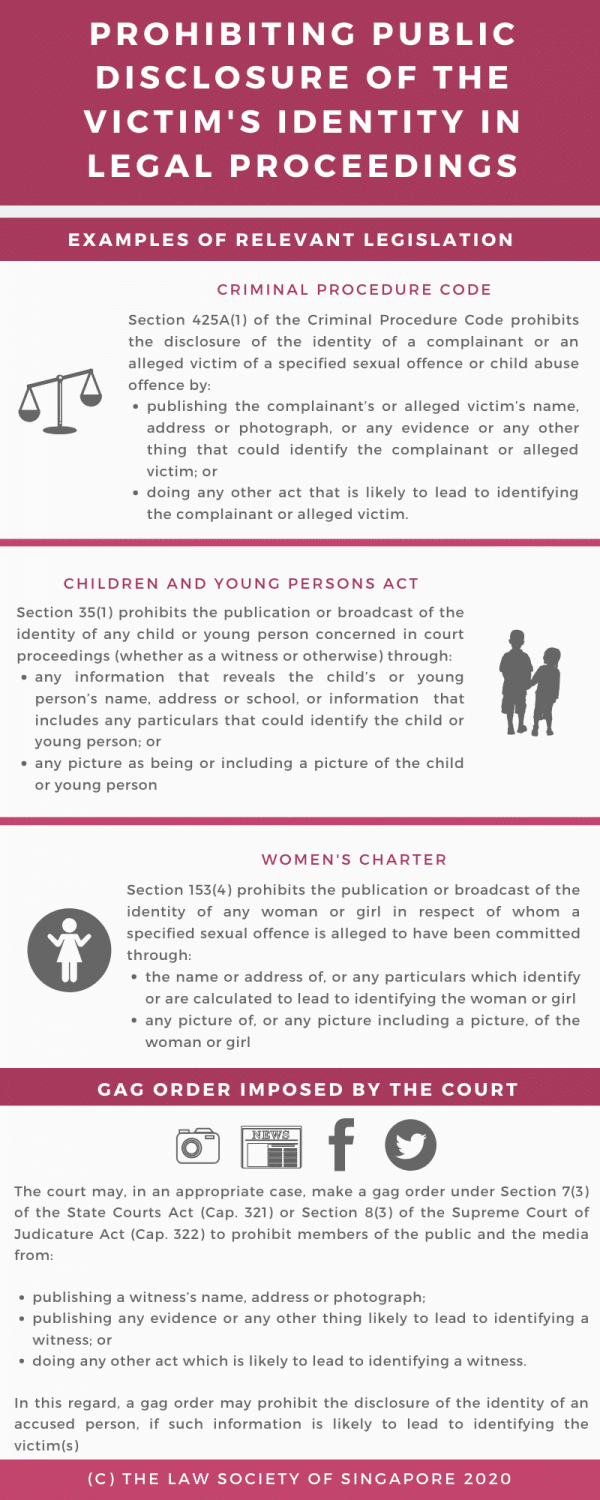Prohibiting Public Disclosure of the Victim’s Identity in Legal Proceedings
The information in the Legal Fact Check Service is provided as a public service by the Law Society of Singapore. The information presented on this site is strictly for information. It is not legal advice and should not be treated as an alternative to seeking legal advice from your lawyer. The information provided in the Legal Fact Check Service is not a definitive analysis of the subject and professional legal advice should always be taken before any course of action is pursued.
Whilst the information presented is considered to be correct at the date of publication, changes in circumstances after the date of publication may impact on the accuracy of the information. The Law Society of Singapore reserves the right to amend any content at any time, at its sole discretion, without prior notice.
The Law Society of Singapore shall not be held liable for any damage or loss of any kind, howsoever caused as a result (direct or indirect) of the use of the Legal Fact Check Service, including but not limited to any damage or loss suffered as a result of reliance on the contents contained in or available from this site.
Prohibiting public disclosure of the victim’s identity in legal proceedings
Transparency in legal proceedings is an important consideration; however, in certain cases, public disclosure of the victim’s identity is not desirable where there is a need to protect his or her privacy, well-being or safety.
Under the law, there are two ways that the disclosure of the victim’s identity in legal proceedings can be prohibited:
- Under relevant legislation such as: Children and Young Persons Act (Cap. 38); Women’s Charter (Cap. 353); and Criminal Procedure Code (Cap. 68); and
- By a ‘gag order’ imposed by the court.
Facts:
Relevant legislation
There are various statutory provisions which prohibit the publication or broadcast of any information relating to any court proceedings that reveal the identifying particulars of a victim and/or a witness. Such a prohibition is usually applied in cases involving minors, or where sexual offences have been committed. Some of the these statutory prohibitions are set out below:
- Section 425A(1) of the Criminal Procedure Code prohibits the disclosure of the identity of a complainant or an alleged victim of a specified sexual offence or child abuse offence in the following circumstances:
- publishing the complainant’s or alleged victim’s name, address or photograph;
- publishing any evidence or any other thing likely to lead to identifying the complainant or alleged victim; or
- doing any other act that is likely to lead to identifying the complainant or alleged victim.
- Section 35(1) of the Children and Young Persons Act prohibits the publication or broadcast of the identity of any child or young person concerned in court proceedings (whether as a witness or otherwise) through:
- any information that reveals the child’s or young person’s name, address or school;
- any information that includes any particulars that are calculated to lead to identifying the child or young person; or
- any picture as being or including a picture of the child or young person.
- Section 153(4) of the Women’s Charter prohibits the publication or broadcast of the identity of any woman or girl in respect of whom a specified sexual offence is alleged to have been committed through:
- the name or address of, or any particulars which identify or are calculated to lead to identifying, the woman or girl; or
- any picture of, or any picture including a picture, of the woman or girl.
This prohibition also extends to the identifying particulars, any evidence given by or any picture of a witness to such proceedings.
Note: The law provides for exceptions to some of the above-mentioned statutory prohibitions, but these are not covered in this write-up.
A breach of the relevant statutory prohibition is punishable as follows:
| Section 425A(1) Criminal Procedure Code | Fine not exceeding $5,000 and/or imprisonment of up to 3 years |
| Section 35(1), Children and Young Persons Act | Fine not exceeding $5,000 and in the case of a second or subsequent conviction, a fine not exceeding $10,000 |
| Section 153(4), Women’s Charter | Fine not exceeding $5,000 and/or imprisonment of up to 3 years |
Gag order imposed by the court
Other than prohibitions against disclosure of the identify of a victim/witness imposed by legislation, the court may, in an appropriate case, make a gag order under Section 7(3) of the State Courts Act (Cap. 321) or Section 8(3) of the Supreme Court of Judicature Act (Cap. 322) to prohibit members of the public and the media from:
- publishing a witness’s name, address or photograph;
- publishing any evidence or any other thing likely to lead to identifying a witness; or
- doing any other act which is likely to lead to identifying a witness.
In this regard, a gag order may prohibit the disclosure of the identity of an accused person, if such information is likely to lead to identifying the victim(s).
A breach of a gag order is punishable as follows:
| State Courts Act | Fine not exceeding $5,000 and/or imprisonment of up to 12 months |
| Supreme Court of Judicature Act | Fine not exceeding $5,000 and/or imprisonment of up to 3 years |
The infographic summarises the law on prohibiting public disclosure of the victim’s identity in legal proceedings.


